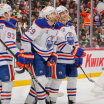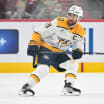WEST PALM BEACH, Fla. -- Montreal Canadiens captain Max Pacioretty sat down with NHL.com on Friday and discussed leadership, his team's underachieving 2015-16 season, teammates, preparing for 2016-17 and more.
Here are some highlights:
Pacioretty on being Canadiens captain
Forward shares thoughts on frustrating season, how Montreal can turn it around
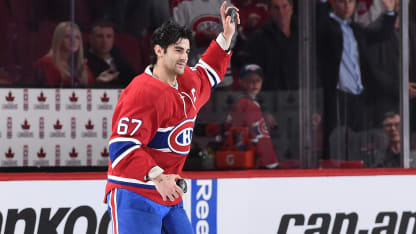
© Francois Lacasse/Getty Images
You've lived a great deal in eight seasons with the Canadiens, with last year's election as team captain surely one of the most memorable moments for you. Does it seem like time has flown by?
"This season seems like it happened 10 years ago and I feel like it was 10 years long. It's all happened so quickly. All these good memories of my career are definitely in storage in my brain but I want to really live in the moment, do the best I can to enjoy all of this, and do the best I can at being a good captain and player for the organization."
The captaincy of the Canadiens doesn't come without sharp criticism from some observers outside the organization. There was no shortage of that in your first year as captain, given the team's failure to make the playoffs …
"I've always said this: It doesn't matter how certain people feel about my game or what type of leader they think I am or how they think I compete. What matters to me most starts with my teammates, how they and management and the organization view me. At the end of the day, we play for each other.
"You want everyone to be happy with your game and have them saying positive things about you. We're all human. But when it comes to system, our style of play, expectations of each other as teammates, it's most important what my teammates feel about me on and off the ice. That's what made being elected captain such a great honor, more than by than any other process. When times get tough, it motivates me. This year obviously wasn't good enough. As captain, I have to find out why, for myself personally, on the ice and off the ice, and for the team as well."
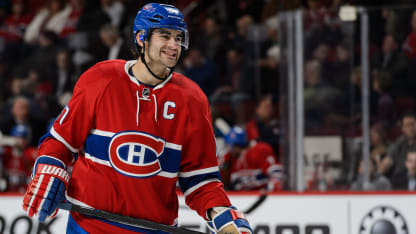
© Minas Panagiotakis/Getty Images
There very much is a leadership-by-committee feel to the Canadiens, with you and alternate captains Andrei Markov, Tomas Plekanec, P.K. Subban and Brendan Gallagher, as well as goalie Carey Price, encouraging input from every player on the team …
"Obviously you can't take all of the leadership on yourself, put it all on your shoulders. We have a great group of players, surrounded by a great leadership group. We've had the same leadership group here for a couple of years. It took a hit with [Price] and Gallagher being injured for so long this season but I think if everyone individually this summer takes the right approach and thinks about what they have to do to be a better player next year, and help the team both on and off the ice, it's just going to make everyone's job that much easier. That's how we'll find success.
"It's good to know that in tough times, I have my teammates' support. That makes me want to be better for them, to be a better captain for them. You can do a good job of dictating the tempo of a game with a certain type of playing style but you still need all your players to play a certain way to win a game. Hockey isn't like basketball, where there's a player who can play the entire game, have the ball in his hands the entire game and completely dominate it. A quarterback in football is so important; he can completely change the outcome of a game.
"In hockey, you need a unit of five to be in synch every time you're out there. A team sport like that makes being a captain a little more unique because you have to make sure everyone's pulling the same way."
How were your season-ending exit meetings with general manager Marc Bergevin and coach Michel Therrien?
"We're obviously all disappointed with the results this year. We all have to be held accountable, we understand that. It starts from the top and goes down through every single player on the team. What encourages me about this organization, the players, management and coaches, is that everybody feels responsible for the way things happened this year.
"That's a good sign. If you're able to look yourself in the mirror and tell yourself 'I have be better,' or be completely honest with yourself, those are very good traits to have, especially in a team sport. We were all humbled this year and through that experience it motivates you to come back stronger and better, no matter if you're a player, coach or management.
"If we all are on board with the same taking of responsibility for what happened, it's contagious. When it trickles down and runs through the room, even to call-ups, guys playing their first couple of NHL games, it's a very good vibe in the room to have. We want winners on our team and in our organization, and that's the mindset of a winner."
Players head off into summer in many different directions. If teammates are close throughout the season, do they stay in touch during the summer?
"The thing I like about our team is that that we're so close. Everyone keeps in contact through the summer on their own. I've been on teams where that hasn't been the case … everyone here wants the best for each other, we're all on board with the same mentality of going cards-in, and making sure we have the right mindset over the summer to do what's best for the team and our personal games.
"We have [online] groups chats and stuff, individual chats, a lot of inside jokes going on, a lot of chirping. That's the best part of our sport. The best teams I've seen have guys who can chirp all day long, go out for a beer and dinner and just laugh about it."
You and center Alex Galchenyuk, with Gallagher on the right wing, were a terrific line late in the season. A lot was made about how the team handled Galchenyuk, from wing to center …
"They really had the right approach with [Galchenyuk]. They want him to be the franchise center and it does take time. People maybe want to compare centers who do well right away on other franchises, in other markets. But you've got to understand: There's no market like Montreal. For [Galchenyuk], it was going to be a little longer of a process, whether it's on-the-ice stuff to deal with, or off the ice. Being the No. 1 center of a franchise like the Montreal Canadiens, you have to make sacrifices. There's no debating that.
"On the ice you're not always going to be the first guy on the rush, but that's a sacrifice you've got to make for your team. Off the ice, you have to be a leader. The No. 1 center of the team is always a leader on a team. You see it on probably 30 teams, he's always a big part of the leadership group of a team. Those are just sacrifices that come with experience.
"This year, [Galchenyuk] gained more experience than any other year, whether it be on the ice, switching positions every now and then, or switching linemates, and then off the ice… not a tough year but he learned a lot. It helped him prepare for the last however many games, 20 games maybe, when he definitely played the best hockey of his career."
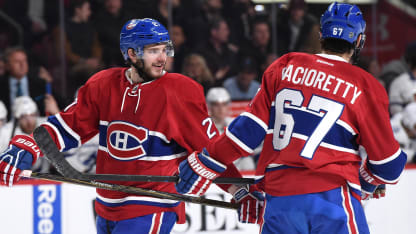
© Francois Lacasse/Getty Images
You'd like to keep Gallagher on the other wing?
"Everyone wants to play with [Gallagher] (laughs). He's a spark plug, you know he's going to mix it up and always work hard, and get to the net and make little plays that make a line better. It's always a lot of fun, playing with [Gallagher], I've always had a lot of success playing with him.
"The three of us are able to really talk to each other, even come down on each other. That's a big part of the game. You see the best guys, they're not on the bench always talking about how great things are. They're saying, 'Hey, wake up, you've got to make that play,' or 'Don't blow your zone and leave your defense or goalie stranded.' I mentioned how [Galchenyuk] grew up at the end of the year and really took on this role as No. 1 center, those were the changes I saw in him the most. [Gallagher] helped with that as well. He's such a great leader. He has a way of getting a message across without sounding too hard on someone. The three of us were really able to be honest with each other and that's really important with a line."
Will you be able to use the summer to totally decompress and get away from the game, even while training for next season?
"When I'm ready to go to Montreal, ready for the season, it's like, 'All right, cards-in, let's do this.' It amps me up. When I'm ready to unwind after the year, I'm ready to completely turn it off. I've kind of known that I'm a man of extremes: If I want to live in the city, I want it to be a huge city. If I want to live in the suburbs, I want it to be very quiet. It goes that way with wanting to be in a city that's crazy about hockey during the year, and that's what I want, and then get away from the craziness during the summer."




